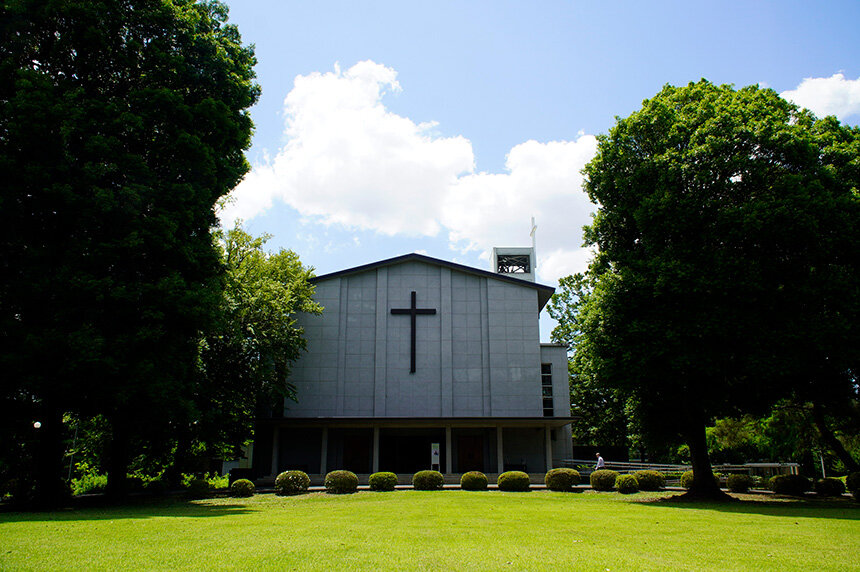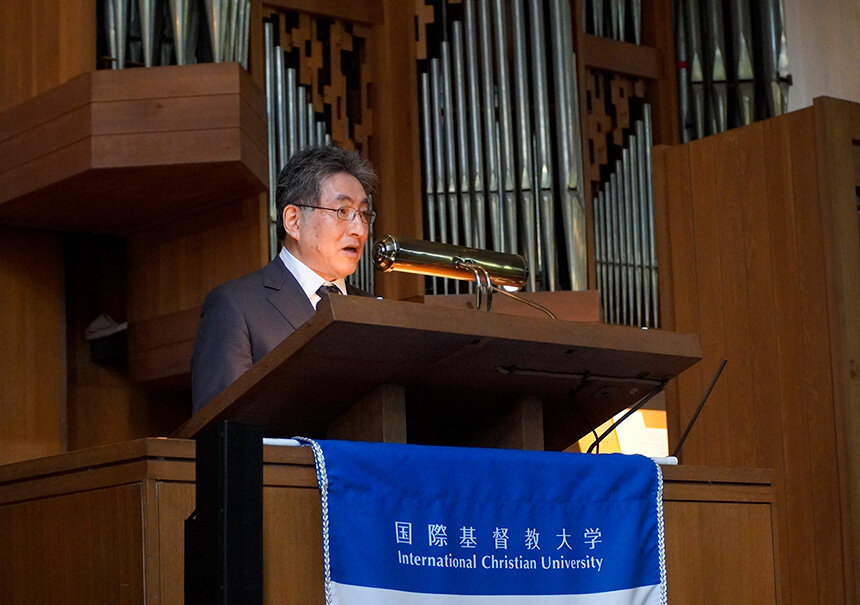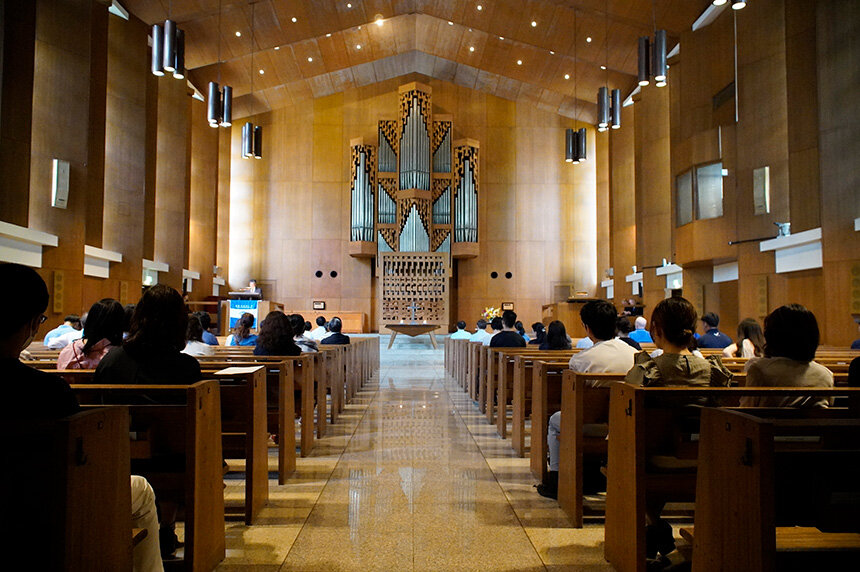NEWS
ICU Founder's Day Commemorative Service
Update: June 14, 2024

A service to commemorate ICU's founding was held at the University Chapel on June 15 (Wed.).
The service is held every year in remembrance of the day when the university was officially established at a meeting of the organizing council of Japanese and North American Christian leaders who gathered at YMCA Tozan-so in Gotemba, Shizuoka Prefecture, on June 15, 1949. On the same day, the Board of Councilors and the Board of Trustees were inaugurated, and the founding principles as well as a fundamental education plan were laid down.
At the service presided over by Acting Director of Religious Center, Professor Jeremiah Alberg, "Be Thou My Vision" was played and 1 Peter 3:8-11 was read. President Shoichiro Iwakiri delivered a message titled "Innovation based on the mission".
Message by Shoichiro Iwakiri, President

This year, ICU celebrates its 75th Anniversary. In June 1949, 75 years ago, the name of the University and its founding objectives were formally decided at a conference held in Gotemba meeting. This is our Founder's day, and today we gather in the Chapel to commemorate it. Four years after the conference, in 1953, the formal opening of the first year's work at ICU took place.
Let's put the year of 1953 in the context of Japanese History after Japan's defeat in World War II. The Supreme Command of the Allied Powers (GHQ) occupied Japan for seven years, from 1945 to 1952, under the de facto rule of the United States. Incidentally, between the time the establishment of ICU was resolved in 1949 and 1953, when classes started, Japan was going through a major transition from an occupied state to an independent country regaining its sovereignty. Both the new Japan and ICU were taking steps simultaneously towards the future.
During the 7-year occupation, Japan did not have formal connections with other countries.
Words like international and global are household terms today, but in a country devoid of diplomatic relations until 1952, the establishment of a new university bearing "international" in its name must have been thrilling, the fresh and emancipating aura it radiated kindling aspirations for renewed global relations, stirring profound emotions that far surpass our contemporary experience.
At the time the Korean War had started in 1950 and McCarthyism was raging in the U.S. In this historical context, the significance of the foundation of ICU seems to have been rather complex.
ICU Professor Emeritus Dr. William Steele, who specializes in modern Japanese history, has written about Christianity and democracy in relation to communism at the time of ICU's founding. "In this context the establishment of ICU gained new urgency-not simply for its promise to spread Christian values in the new Japan, but more strategically as a means to counter the 'siren call of communism.'"
According to Professor Steele, Dr. Diffendorfer, who contributed to the establishment of JICUF in 1948, believed that Christianity could serve as an antidote to Communism, a view he shared with the Supreme Commander for the Allied Powers General Douglas McArthur.
To some extent, this was one of the underlying reasons for the establishment.
But that was only part of the story - the sole reason for the move to establish a university, a center for education and research, could not have been a political one. There was an ardent desire to build a liberal institution open to the world founded on democratic ideals, Christian compassion and a spirit of reconciliation. In the process of constructing such an establishment, the political backdrop of the era became entwined, regardless of the intentions of the founders. Dr. Steele refers to how ICU developed in a direction of democratic peacebuilding of its own, perhaps in a way that betrayed the political and military expectations of the United States.
What was then at the root of the genuine passion to create ICU?
As I mentioned to you at the Matriculation Ceremony this year, the genesis of ICU can be traced back to a sermon delivered approximately 80 years ago in Richmond, Virginia, by Reverend John Maclean, entitled "A Suggestion As Foolish as the Teaching of Jesus of Nazareth." He suggested that Americans seek atonement based on the Christian spirit, as nationals of the country that wrought catastrophic damage to Japan during the Pacific War. This view inspired the move to collect donations in the U.S. and Canada, which spread to the general public in Japan. This passion was the key to the establishment of ICU.
Reverend Maclean stated that it was an action taken "to destroy the seeds of future wars. " This strong intention for peace was at the root of the founding of ICU.
ICU was born from what could be regarded as a foolish idea from the common sense of the time, through generous donations motivated by goodwill.
The University Constitution adopted on June 15, 1949, states the University's objective: "The University will seek to prepare leaders for the building of a new Japan dedicated to peace and contributing to the progress of world culture."
Among the six items listed to achieve this objective, the third states, "Through intimate, personal relationship between students and faculty, (...) it shall seek to develop Christian character, uplift personality and advance learning."
The fourth says, "It shall seek to maintain a creative, scientific philosophy of education for the purpose of advancing spontaneous, independent, creative thinking."
The fifth asserts, "It shall endeavor to combine learning with actual life, through work projects requiring manual labor, and social activities leading to the development of personality."
ICU has continued to cultivate "intimate, personal relationships between students and faculty" and "spontaneous, independent, creative thinking" since foundation, both important pillars in the education it offers. We will continue to develop these features.
Our founding objective, established 75 years ago to nurture leaders who would build a new Japan, has undergone a paradigm shift. Our current purpose is to nurture leaders who will create a better world for the next generation.
The manual labor mentioned in the fifth item was probably implemented at ICU in the founding days by running a farm. Chicks, sheep, hogs, cows, a bull and farming equipment were delivered to the ICU campus from the U.S. to engage in farming. This farm no longer exists, but with support from JICUF, we will initiate our Farm Project with a Farm Manager on our 75th anniversary. Within the context of our history in the last few decades, this is a new initiative, but it is also a project to realize our founding philosophy. Together with the ICU Honey and Wasabi projects, these are admirable initiatives, demanding not only intellectual consideration of environmental and food issues but also substantial physical labor.
This year in 2024, JICUF, a key supporter since the University's inception, opened its office on the campus for the first time in our history. I am deeply grateful that the close relation with the Foundation since establishment will be promoted even further, made possible by our common mission to nurture global citizens who pursue peace and the common good.
The university, by placing itself in its historical context, can realize its philosophy of establishment in accordance with the demands of the times. It is such a blessing to be able to return to the founding philosophy, as its unwavering vision and mission enable us to carry on our experiments in realizing our original missions. We must constantly ask ourselves whether these trials serve God's will. Let us pray.
Omniscient God, we beseech thee to gaze into the depths of our hearts, even the unexplored corners of our minds. Guide us to realize the good in peace with thy boundless mercy. Amen.

